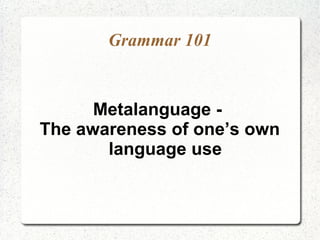
Upper Primary B - Metalanguage
- 1. Grammar 101 Metalanguage - The awareness of one’s own language use
- 2. Learning Objectives To review areas of grammar knowledge that are required to excel in upper primary levels. To build the foundation for learning better and easier through the understanding of how metalanguage works.
- 3. Introduction The word 'meta' means 'self-awareness' For example, 'metacognition' means being aware of one's own thoughts. Metalanguage then refers to an awareness of one's own language as it is being used. Our metalanguage ability is directly related to our knowledge of grammar and vocabulary since both these form the mechanics – the bedrock – of language.
- 4. Metalanguage in use As an illustration, let’s read the following sentence: “The boys is noisy and must saw the principle soon.” Having metalanguage is to have an awareness that something is not quite right. The way you read it, it sounds funny. Isn't it? There are two errors: ‘boys is’ – boys are (Subject-verb agreement) and, ‘must saw’ – must see (Modal Use)
- 5. Metalanguage explained Metalanguage is the ability to sense that something is wrong with a sentence construction and explain it. It takes proficiency in grammar – the rules on language use – to be able to know that a sentence is grammatically wrong and state the reasons.
- 6. Metalanguage in use How then is this metalanguage developed? Through the consistent and persistent use of language, your proficiency in it, trained and guided by an competent user like your trainer, increases. It bears repeating then that metalanguage is formed and becomes highly- refined over time after practice. Metalanguage also involves a working knowledge of the terms used in language. If not, the errors you make will be nameless!
- 7. Developing Metalanguage Throughout this course, we will be developing some key areas of grammar knowledge to know the rules in using English: 1) prefixes, suffixes, root words, parts of speech 2) tenses – past, past continuous and past perfect 3) Subject-verb agreement – rules for nouns and verbs in a sentence 4) Connector – addition, exclusion, emphasis and cause-effect 5) Sentence formation – simple, complex, compound
- 8. Activity Identify and explain the errors in the following sentences: 1) “It was great as it is fun swim.” 2) “I would never forgot what 3) “Mark never recovered and was subconscious after the accident.” 4) “Although he is smart but he is lazy.” 5) “The passer-bys all stood and watched.” 6) “All the running and play has worn him out.”
- 9. Metalanguage's top 5 benefits 1) It gives you a vocabulary for your mistakes so you remember them. 2) It helps you to communicate with your teacher as you use a standard way of explaining errors. 3) It allows self-correction, having learnt the rules of language, to identify and avoid them. 4) It forms the basis for building further knowledge in vocabulary and grammar 5) It builds your confidence that you are learning the correct things in language.
- 10. Discussion 1) What do you think is the reason why students make lots of grammar mistakes? 2) State two benefits of being proficient in metalanguage.
- 11. Discussion (with suggested answers) 1) What do you think is the reason why students make lots of grammar mistakes? They are not proficient in metalanguage – the understanding of how grammar works so as to identify and explain grammar rules 2) State two benefits of being proficient in metalanguage. 1st – it gives us self-correction ability 2nd – it gives us confidence when using language
- 12. In Summary • The ability of using language accurately according to grammar rules carries great weightage in English Language. • Metalanguage – or the ability to understand one’s own use of language – is built from a strong grasp of grammar rules. • Good metalanguage – to be able to identify and explain grammar errors or poor language use – helps us in correcting our own language mistakes.
